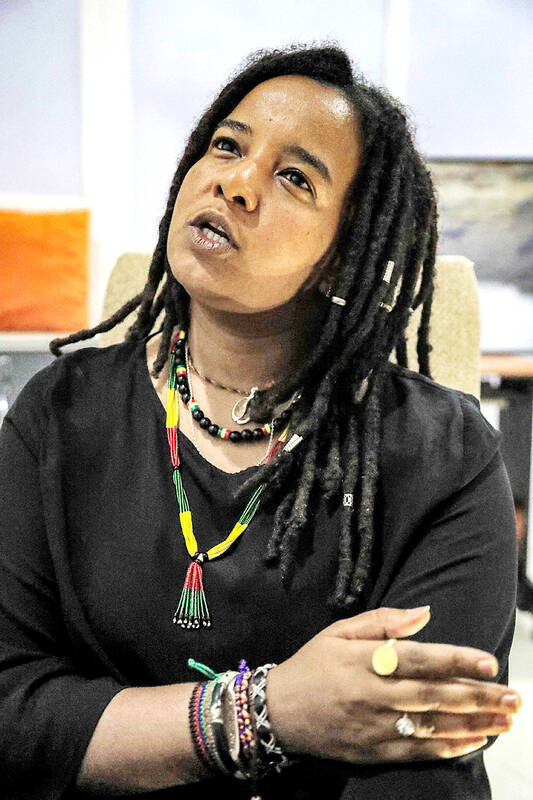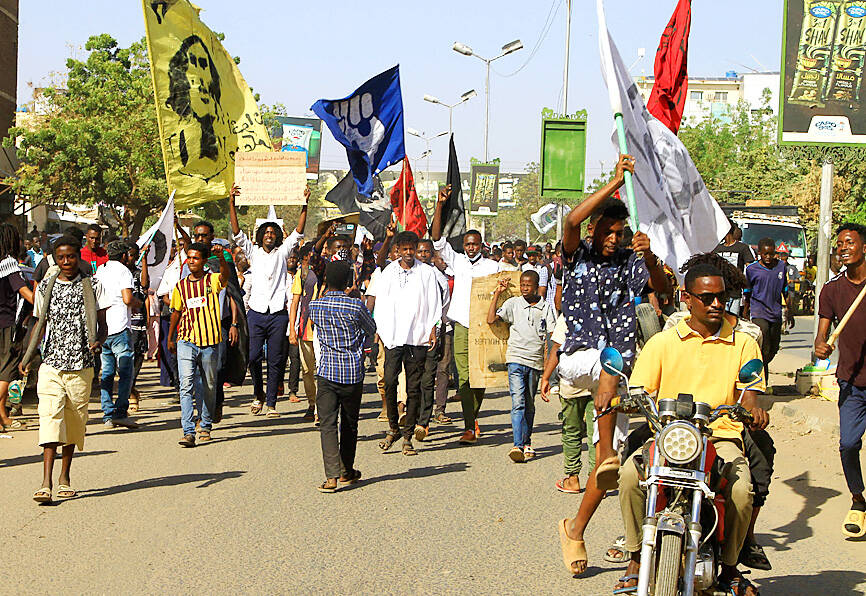With his distinctive long dreadlocks and slouchy beanie, Abdallah Ahmed has always known his choice of lifestyle means trouble in Sudan, where long-oppressed Rastafarians say they are being targeted anew.
Ahmed, 31, has for years been enamored of the Rastafari tradition, which emerged in Jamaica last century and for him represents “telling the truth, being courageous, fighting for rights.”
The number of Rastafarians in Sudan is unknown and the community had largely lived underground under the rule of former Sudanese president Omar al-Bashir, who was ousted in April 2019 following mass protests against his government.

Photo: AFP
“We were very enthused after [al-]Bashir’s fall,” said Ahmed, a long-time Bob Marley fan also known as “Maxman,” at an art exhibition where he was performing reggae music with his band.
“Musicians and artists flourished,” he said, donning brightly colored head and wrist bands.
However, a brief whiff of freedom did not last as a transition to civilian rule was upended last year when General Abdel Fattah al-Burhan, head of the Sudanese armed forces, led a coup.

Photo: AFP
Rastafarianism considers former Ethiopian emperor Haile Selassie to be its messiah, but like many followers in Sudan, Ahmed said that he saw it “not as a religion.”
“It’s a lifestyle and it’s me,” he said.
Under al-Bashir, community members were regularly harassed, had their heads shaved and faced persecution under public order laws restricting how people dress or behave in public.
Ahmed said he had been arrested for drug possession in 2017 while performing music in public and was flogged 20 times.
Followers of the Rastafari tradition have always been “easy targets” for security forces due to their looks, Ahmed said. “It however never stopped us from growing our hair.”
“Some of us died while holding on to their personal lifestyle,” he said.
The killings of several Sudanese Rastafarians in mass anti-coup demonstrations since al-Burhan’s takeover last year have given rise to a popular protest slogan “the Rasta never dies.”
Noting the “peacefulness and spontaneity” of the demonstrations, 35-year-old filmmaker Afraa Saad said that it “made us believe they were being especially targeted.”
“I believe the slogan emerged to say that their good reputation will last,” Saad said.
Being a woman, Saad said she has faced greater scrutiny than male Rastafarians, as she embraced the tradition during the height of the demonstrations against al-Bashir.
“The most persistent objection is why would a girl wear dreadlocks when there are other more acceptable hairstyles,” she said, adding that there is a “prevalent stereotype” tying dreadlocks with drug use and “unbecoming behavior.”
Saad sees her lifestyle choice as part of Sudanese women’s uphill battle against strict policing of social mores since the al-Bashir regime.
Women were at the forefront of the mass protests against his government, voicing their anger at decades of discrimination that severely restricted their role in society.
“I simply don’t heed to this,” Saad said. “This is my identity and it’s who I am.”
For some in Sudan, wearing dreadlocks, listening to reggae music or having a Rasta-like lifestyle is merely an act of defiance.
Saleh Abdalla, 26, who wears his hair in short dreadlocks, said it was his way of protesting last year’s coup.
“We are refusing all violations that take place on behalf of authorities,” he told reporters during one anti-coup demonstration in the capital, Khartoum, last month.
“I will keep the Rasta [dreadlocks] until the regime falls,” Abdalla said.

Kehinde Sanni spends his days smoothing out dents and repainting scratched bumpers in a modest autobody shop in Lagos. He has never left Nigeria, yet he speaks glowingly of Burkina Faso military leader Ibrahim Traore. “Nigeria needs someone like Ibrahim Traore of Burkina Faso. He is doing well for his country,” Sanni said. His admiration is shaped by a steady stream of viral videos, memes and social media posts — many misleading or outright false — portraying Traore as a fearless reformer who defied Western powers and reclaimed his country’s dignity. The Burkinabe strongman swept into power following a coup in September 2022

TRUMP EFFECT: The win capped one of the most dramatic turnarounds in Canadian political history after the Conservatives had led the Liberals by more than 20 points Canadian Prime Minister Mark Carney yesterday pledged to win US President Donald Trump’s trade war after winning Canada’s election and leading his Liberal Party to another term in power. Following a campaign dominated by Trump’s tariffs and annexation threats, Carney promised to chart “a new path forward” in a world “fundamentally changed” by a US that is newly hostile to free trade. “We are over the shock of the American betrayal, but we should never forget the lessons,” said Carney, who led the central banks of Canada and the UK before entering politics earlier this year. “We will win this trade war and

‘FRAGMENTING’: British politics have for a long time been dominated by the Labor Party and the Tories, but polls suggest that Reform now poses a significant challenge Hard-right upstarts Reform UK snatched a parliamentary seat from British Prime Minister Keir Starmer’s Labor Party yesterday in local elections that dealt a blow to the UK’s two establishment parties. Reform, led by anti-immigrant firebrand Nigel Farage, won the by-election in Runcorn and Helsby in northwest England by just six votes, as it picked up gains in other localities, including one mayoralty. The group’s strong showing continues momentum it built up at last year’s general election and appears to confirm a trend that the UK is entering an era of multi-party politics. “For the movement, for the party it’s a very, very big

‘BODIES EVERYWHERE’: The incident occurred at a Filipino festival celebrating an anti-colonial leader, with the driver described as a ‘lone suspect’ known to police Canadian police arrested a man on Saturday after a car plowed into a street party in the western Canadian city of Vancouver, killing a number of people. Authorities said the incident happened shortly after 8pm in Vancouver’s Sunset on Fraser neighborhood as members of the Filipino community gathered to celebrate Lapu Lapu Day. The festival, which commemorates a Filipino anti-colonial leader from the 16th century, falls this year on the weekend before Canada’s election. A 30-year-old local man was arrested at the scene, Vancouver police wrote on X. The driver was a “lone suspect” known to police, a police spokesperson told journalists at the